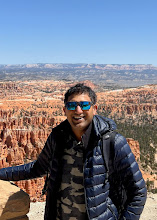Sunday, July 29, 2007
Saturday, July 21, 2007
Sports: Tour De France (Updated)
Running from Saturday July 7th to Sunday July 29th 2007, the 94th Tour de France will be made up of a prologue and 20 stages and will cover a total distance of 3,550 kilometres.
Distinctive aspects of the race
- 3 mountain finishes
- 2 rest days
- 117 kilometres of individual time-trials (including the prologue)
- 21 Category 1, Category 2 and highest level passes will be climbed
Extracted from official site
The following pages are a very good resource
Event News
Race Preview 2007
Tour De France has a very passionate following, however it is a sport that is caught in a bunch of controversies these days. Personally I watch the event whenever I get a chance and hope that I go to France and watch the final race at Paris Champs-Élysées, someday.
Some more views:
Dopers on Wheels: The Tour's sorry history
A Freakonomics Blog
Distinctive aspects of the race
- 3 mountain finishes
- 2 rest days
- 117 kilometres of individual time-trials (including the prologue)
- 21 Category 1, Category 2 and highest level passes will be climbed
Extracted from official site
The following pages are a very good resource
Event News
Race Preview 2007
Tour De France has a very passionate following, however it is a sport that is caught in a bunch of controversies these days. Personally I watch the event whenever I get a chance and hope that I go to France and watch the final race at Paris Champs-Élysées, someday.
Some more views:
Dopers on Wheels: The Tour's sorry history
A Freakonomics Blog
Labels: sports cycling
Thursday, July 19, 2007
Books: Flat Paperback World
As I await the release of the paperback edition of the The World Is Flat: A Brief History of the Twenty-first Century, a friend recommended a interview of Thomas Friedman on a show by Charlie Rose.
The video Charlie Rose - An hour with Thomas L. Friedman (Guest Host: John Doerr) is below. Please note the interview is more than a year old.
The video Charlie Rose - An hour with Thomas L. Friedman (Guest Host: John Doerr) is below. Please note the interview is more than a year old.
Saturday, July 07, 2007
Statistics: IITians (Updated)
Roughly 150 to 160 thousand students have graduated out of IITs since their inception. About one third of them or around 50 thousand are in the Unites States.
Mentioned by Rajat Gupta in an interview with Fareed Zakaria .
Update:
Fareed: But ofcourse, now the IIT graduates are not coming here, they are staying at home, right?
Rajat: Many of them are staying at home, more and more of them are staying at home.
Mentioned by Rajat Gupta in an interview with Fareed Zakaria .
Update:
Fareed: But ofcourse, now the IIT graduates are not coming here, they are staying at home, right?
Rajat: Many of them are staying at home, more and more of them are staying at home.
Philosophy: Food for thought
What means everything to one person, could mean nothing to the next person. Everything in political, social and corporate systems revolves around reversing this.
Sunday, July 01, 2007
Techology: Interview
An interesting interview with an IIT alumni, Umang Gupta, which appeared in the San Francisco chronicle today.
Some snippets are:
Q: What is your take on Silicon Valley? What is it about the valley that makes it happen?
A: There's no place like it on Earth. It is a combination of an amazing academic setup -- Stanford and Berkeley and others -- combined with venture capital that has over time grown up here, so it's an institutional knowledge of how to invest, combined with companies that are at the center of their industries, whether it's the Internet or enterprise software or the semiconductor or hardware industries.
...
Q: Has America become the place whose lunch everybody wants to eat? Does America get to eat the world's lunch, or is America disadvantaged in the future?
A: I think it's a deeper economic question ...
Nobody has to eat anybody else's lunch. There is plenty for everybody.
Click for the complete interview
Some snippets are:
Q: What is your take on Silicon Valley? What is it about the valley that makes it happen?
A: There's no place like it on Earth. It is a combination of an amazing academic setup -- Stanford and Berkeley and others -- combined with venture capital that has over time grown up here, so it's an institutional knowledge of how to invest, combined with companies that are at the center of their industries, whether it's the Internet or enterprise software or the semiconductor or hardware industries.
...
Q: Has America become the place whose lunch everybody wants to eat? Does America get to eat the world's lunch, or is America disadvantaged in the future?
A: I think it's a deeper economic question ...
Nobody has to eat anybody else's lunch. There is plenty for everybody.
Click for the complete interview



